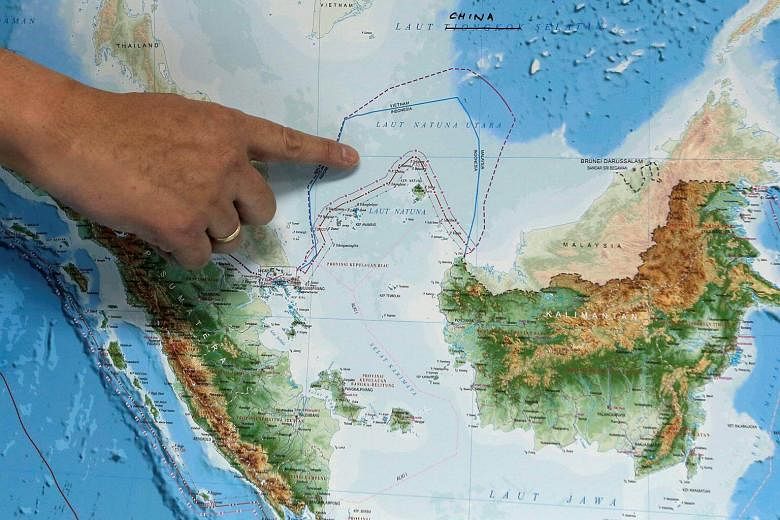So, Indonesia will henceforth refer to the northern reaches of its exclusive economic zone in the South China Sea as the North Natuna Sea.
Talk of well, a sea-change in attitudes in Jakarta on the dispute that has roiled the region for the past five years!
In January last year, at a closed door session in a South-east Asian nation organised by a European think-tank, the South China Sea situation figured prominently in some panels. A top Indonesian diplomat insisted that his country was not a party to the dispute, and that China had assured Jakarta it had no overlapping claims with it.
When another delegate intervened to say that senior Chinese military officials state their belief that 50,000 sq km of Indonesia's exclusive economic zone belongs to China it was met with incredulity.
A few months later, Indonesia willy-nilly had to acknowledge it had a problem when the Chinese coast guard intervened to free a poaching vessel within Indonesia's territorial waters while it was being towed towards shore. Since the ship had been seized in Indonesia's EEZ, there was little question what the Chinese action meant.
It is clear that archipelagic Indonesia has been doing some serious reflection about the South China Sea situation and its implications for its own strategic calculations.
The renaming is really a symbolic gesture.
But it is an important one since it comes from the largest Asean nation and its biggest economy.
For some months now, Indonesia also has been beefing up its military presence in the area.
What's more, the Indonesian gesture of assertiveness comes in the wake of Vietnam extending to India a concession to drill in waters contested by China.
Ever since Indonesian President Bambang Yudhoyono retired from office, the region has felt a leadership gap, missing the energy that his foreign minister Marty Natalegawa brought to his office.
His successor, President Joko Widodo, has been a reticent character. Lately, Mr Joko has been more assertive in his own country.
Now the region would surely be interested to know if the popular Indonesian president has a vision for South-east Asia as well.
If he follows through on his government's announcement on Friday, it is one more signal to China that this is one issue that cannot be easily put away.
Meanwhile, as one analyst pointed out on Friday (July 14) night, there are now four names for these waters. The Chinese call it the South Sea, Vietnamese the East Sea, for Manila it is the West Philippines Sea and for Indonesia, North Natuna Sea. Enough to make anyone's head swim.
Abe and Modi confront a different public
It is no secret that Japanese Prime Minister Shinzo Abe and his Indian counterpart, Mr Narendra Modi, share a deep bond of friendship.
Strong leaders both and with a vision to reshape the destiny of their nations, they have sought to set in place policies that could potentially have lasting consequences for their people.
After the landslide victory of his party in Uttar Pradesh, India's largest state by population, Mr Modi seemed set to rule India for at least a second term after the current one expires in 2019.
Likewise, Mr Abe seemed set to rule comfortably until at least 2021 since he looked set to win a third term as party leader, and hence, PM, when his current term ends in 2018.
A few months is a long time in politics, however.
Suddenly, Mr Abe's gilt-edged franchise with his people, which helped him ram through some key constitutional amendments, has ebbed significantly. A survey by Jiji news agency that was released on Friday showed support for his government had fallen 15.2 points from a month earlier to 29.9 per cent.
The biggest reason cited was a lack of trust in the prime minister, partly because of a sense he was taking them for granted and partly because of a swirling scandal over suspicion that he had helped a friend's business.
Mr Modi, on the other hand, is at the other end of the spectrum in his ratings, according to a Forbes report that cited an OECD study. Apparently, he enjoys the highest trust of his people among all world leaders, with a whopping 73 per cent supporting him, significantly ahead of the Canadian government headed by Mr Justin Trudeau, which had an endorsement level of 62 per cent.
What could explain this divergence? Mr Modi, after all, has had his policy mis-steps, including the most spectacular of all, a so-called "demonetisation" of high value currency notes in an effort to tamp down on illegal cash hoards.
The difference is perhaps this: Mr Modi, who took office, after a decade of corruption scandals under Mr Manmohan Singh's watch, has run what seems a blemishless government on that score. While the Indian public knows he has erred, they clearly do not doubt his sincerity.


